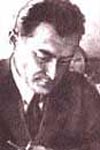The page of Petrov, Jevgenyij, English biography
Biography
Ilya Ilf (1897-1937) & Yevgeny Petrov (1903-1942)Russian team of writers and journalists, whose best known work is the satirical novel The Twelve Chairs (1928). In the story Ostap Bender, a clever scoundrel, tries to find in the Soviet Russia of 1927 hidden jewelry with Ippolit Matveyevich Vorobyaninov, a former nobleman. Ilf and Petrov also published a large number of stories and sketches under the pseudonym "Tolstoyevsky" in Soviet magazines and newspapers. The literary reputation of the two writers rests mainly on their collaborative works - other books have not stood the test of time.
"Bon jour!" sang Ippolit Matveyevich to himself as he lowered his legs from the bed. "Bon jour" showed that he had woken up in a good humor. If he said "Guten Morgen" on awakening, it usually meant that his liver was playing tricks, that it was no joke being fifty-two, and that the weather was damp at the time." (from The Twelve Chairs)
Ilya Ilf (pseudonym of Ilya Arnoldovich Fainzilberg), was born in Odessa as the son of a bank clerk. After graduating from a technical school in 1913, he worked in an architect's office, aviation plant, and hand grenade factory. He also contributed to a humor magazine, Sindektikon. In 1923 he moved to Moscow, where he obtained a post of librarian and wrote for various newspaper and humor magazines. Two year later he became a journalist for the magazines Gudok and Moriak. During his visit in Central Asia, he witnessed the clash between the old customs and new system, which became one of the central themes of The Twelve Chairs. With Petrov he started to write humorous pieces for Pravda and other publications. The collaboration lasted nearly a dozen years. Ilf died on April 13, 1937 of tuberculosis which he had contracted on his journey in the United States.
Yevgeny Petrov (pseudonym of Yevgeny Petrovich Kataev) was born in Odessa as the son of a history teacher. He graduated in 1920 from a classical Gymnasium and started his career as journalist. In 1921 he became correspondent for the Ukrainian Telegraphy. Before moving to Moscow in 1923, he worked at Odessa Criminal Investigation Department. Petrov was appointed sub-editor of the satirical journal Krasnyi perets and in 1923 he joined the staff of the newspaper Gudok, a publication for railway workers. Originally Petrov had no ambition to become a writer. However, his elder brother, the novelist Valentin Kataev (1897-1986), encouraged him to compose short stories, and a small collection was published in 1924. Petrov married in 1929. From 1932 he contributed to Pravda and Krokodil.
In 1925 Petrov became acquainted with Ilf, who also worked for Gudok. Their first book, The Twelve Chairs, gained a huge success. It appeared during the relatively liberal period, when the New Economic Policy (NEP) allowed limited private enterprise. The idea for the story was suggested by Valentin Kataev. Ostap Bender, the utterly amoral protagonist, meets during his adventures a wide variety of opportunists, bureaucrats, and crooks and swindlers of the NEP period. As a traveling con artist he has much in common with Gogol's Pavel Ivanovich Chichikov from The Dead Souls (1841-46). Two groups seek jewelry, which were hidden during the Russian Revolution by a rich old lady in one of 12 chairs. The chairs have been confiscated by the new regime, and sold to different persons. Bender and others treasure hunters track down the various owners from the provinces to the Soviet Georgia and the Transcaucasus mountains. At the end of the story Bender is killed by his companion Ippolit Matveyevich, who eventually discovers that the diamonds have already been found and subsequently sold to build a workers' club. Bender represents values of the old order - egoism and individualism. He knows "four hundred ways to get money without working for it", and he has no future in the postrevolutionary Soviet Union. The story has inspired stage and film adaptations, not only in the Soviet Union but also in the United States. Mel Brooks's film version from 1970 received mixed critics. Brooks directed, scripted, authored a song, and played in a small role. In spite of all his efforts, his humor was not as sharp as in The Producers (1968).
Ostap Bender: Ah, whatever became of your lovable master?
Tikon: One night, about ten years ago, was a fearful noise. There was bombs and cannons and soldiers shooting, it was terrible, terrible.
Ostap Bender: Ah, I think it was called the revolution.
Tikon: That was it, the revolution. You're smart. You're smart and you're gorgeous. You're okay. Any ways, they all runaway.
Ostap Bender: Well, come here old boy. Let us see how drunk two Russians can get on one ruble.
(from The Twelve Chairs, dir. by Mel Brooks, 1970)
1001 den; ili; Novaya Shakherezada (1929), published under the pseudonym F. Tolstoevskii, was a collection of satirical novellas. The Golden Calf (1931), a sequel to The Twelve Chairs, resurrected Ostap Bender with a tell-tale scar across his throat. This time he manages to become a millionaire but in workers' paradise money doesn't bring him fame and power. He fails - and the only thing he manages to keep after a customs inspection is a medal, the Order of the Golden Fleece (or Golden Calf). Although humor in The Golden Calf was clearly propagandistic in tone, and its world view was not so bleak, the Soviet officials were not interested in publishing the work, until after Maksim Gorky's personal intervention. Ilf and Petrov also planned to write a third novel, in which Bender is sent to a hard-labour camp on the Solovetsky islands, where he becomes a model citizen.
In 1933-34 Ilf and Petrov visited western Europe. They met the famous Russian journalist Ilya Ehrenburg in Paris, and wrote with him a film comedy, which was not produced. According to Ehrenburg, Ilf's humor was bitter; Petrov was optimistic, his humor was more humane, and he wished good for all people. Little Golden America (1936) was based on their transcontinental automobile trip in the Unites States. They met Ernest Hemingway and Henry Ford, and after seeing over one hundred movies, the two committed communists preferred their own country. Ilf's death was a hard blow to Petrov, who then wrote only little fiction. He limited himself mainly to film scripts and edited a collection of Ilf's private notebooks (1937-38). In 1940 he joined the Communist Party and became editor of the journal Ogonyok. In 1941 Petrov visited Germany, half a year before the Nazis attacked the Soviet Union, and told: "The Germans are tired of war..." During World War II Petrov served as a war correspondent. He died in an airplane crash returning from besieged Sevastopol on July 2, 1942. Petrov's reports from the front were published posthumously under the title Frontovoy dnevnik (1942). The Twelve Chairs is considered a cult classic and has been reprinted a number of times. The character of Ostap Bender is in Russia a part of the national mythology. A museum devoted to his memory has been established in St. Petersburg. His first name, Ostap, was perhaps a homage to Osip Šor, a colorful policeman and a friend of Ilf and Katev.
http://www.kirjasto.sci.fi




